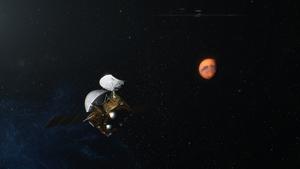 This undated file photo shows an illustration of Tianwen 1 probe entering Martian orbit. (PHOTO PROVIDED TO CHINA DAILY)
This undated file photo shows an illustration of Tianwen 1 probe entering Martian orbit. (PHOTO PROVIDED TO CHINA DAILY)
BEIJING - China's Tianwen 1 probe on Wednesday entered Mars parking orbit after performing an orbital maneuver, according to the China National Space Administration.
ALSO READ: China releases video of Tianwen 1's entry into Mars orbit
At 6:29 am (Beijing Time), Tianwen 1 entered the parking orbit, with its closest point to the planet at 280 km and the farthest point at 59,000 km, the administration said in a brief statement.
It will take Tianwen 1 about two Martian days to complete a circle (a Martian day is approximately 40 minutes longer than a day on Earth), the CNSA said.
All the seven mission payloads on the probe's orbiter will be gradually activated during the probe's three-month stay in the orbit to carry out scientific tasks, according to the China National Space Administration
All the seven mission payloads on the probe's orbiter will be gradually activated during the probe's three-month stay in the orbit to carry out scientific tasks, according to the CNSA.
The medium-resolution camera, high-resolution camera and spectrometer will carry out a detailed investigation on the topography and dusty weather of the pre-selected landing area in preparation for a landing.
Tianwen 1, the country's first independent Mars mission, was launched by a Long March 5 heavy-lift carrier rocket on July 23 from the Wenchang Space Launch Center in Hainan province, kicking off the nation's planetary exploration program.
The 5-metric ton probe, which consists of two major parts - the orbiter and the landing capsule - has flown for 215 days and about 475 million km on its journey to Mars. The average flight speed was about 100,000 km per hour.
Currently, it is about 212 million km away from Earth, the space administration said.
It entered the orbit around Mars on Feb 10 and performed two orbital adjustments on Feb 15 and Feb 20.
READ MORE: China’s space program logs record year
The Tianwen 1 mission's ultimate goal is to land a rover in May or June on the southern part of Mars' Utopia Planitia-a large plain within Utopia, the largest recognized impact basin in the solar system-to conduct scientific surveys.
Tianwen 1 is the world's 46th Mars exploration mission since October 1960, when the former Soviet Union launched the first Mars-bound spacecraft. Only 18 of those missions were successful.
With Xinhua inputs


